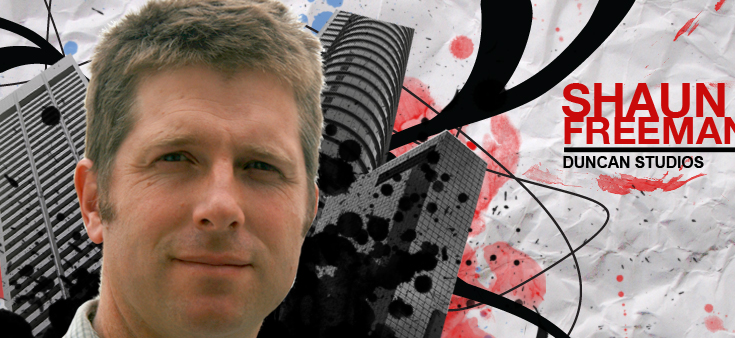|
Animation Mentor:
What inspired you to become an animator?
Shaun Freeman:
I've always been keen on animation, but the idea of working as a professional animator
didn't occur to me until I watched a short film by Jeff Lew called Killer Bean in 2000.
The same evening, I also found Victor Navone's Alien Song. After watching them both
and finding out that they had both been done by self-taught animators, I decided that I
wanted to do the same thing, so every evening for the next three years I obsessively
taught myself to animate. I researched online, I practiced and didn't get much sleep.
Animation Mentor:
If you could do one thing differently on your journey to becoming an animator, what would it be?
Shaun Freeman:
Without a doubt, it would be to have started the whole process a lot sooner. All through
school I was always obsessively interested in art and animation, but it never occurred to
me that it might be a career path. Instead, I chose to do a science degree majoring in
biochemistry, followed by a graduate diploma in education, and for the next 10 years I
taught science to high school students. If I was able to do it over, I would have followed
my interests much more closely. Although I was always interested in science, I was never
as passionate about it as I am about art and animation.
Animation Mentor:
Who is your favorite character that you've animated and why?
Shaun Freeman:
April O'Neal was fun to animate on Teenage Mutant Ninja Turtles and I also really enjoyed animating Boog and the Ducks on Open Season 2. By the end of the project I was very comfortable getting performances out of them.
Animation Mentor:
What was your first animation job?
Shaun Freeman:
I was employed by the German company Jamster to create cute fuzzy little creatures and
animate them for mobile phone ringtones. They initially contacted me to buy the rights to
a character I had created while I was learning to animate, and it snowballed from there,
and for a while I basically worked as a remote animator for them. The process of5
switching careers was a bit hairy because at the point that I decided to take the plunge and quit my teaching job to work as a full-time freelance animator, my wife was very pregnant with my son. Quitting was a big risk as we might have no income. No one I knew had tried to work remotely as a freelance animator for companies overseas. I took my long service leave (after having taught for 10 years) and during that time worked to build up enough contacts to allow me to quit. When my long service leave ended, we took the plunge and have not looked back or regretted the decision for an
instant.
Animation Mentor:
Who would you consider your mentor to be in animation?
Shaun Freeman:
That's a very difficult question For the most part, I taught myself to animate over a
long period of time. I spent many, many hours looking at the work and thoughts of a great many animators to help as I tried to figure out how it all worked. So it's a difficult
question because there are so many that I have used for guidance. I guess Richard Williams' book really began opening the windows for me with regards to the secrets and joys of animation, so if there was anyone who affected the way I thought about animation, it would have to be him. But there have been a whole raft of other animators who I sucked up the information from (invariably from the internet) during the process.
Animation Mentor:
How has the Animation Mentor experience been for you so far?
Shaun Freeman:
From the perspective of a trained high school teacher, the whole process has been an overwhelmingly positive experience. It's really rewarding to be able to help students who are so motivated and keen to learn. At the same time, to be involved in such a cutting-edge school has been a great motivating process for me to continue to push my own skills. Overall, I've really enjoyed the whole process from top to bottom.
Animation Mentor:
What is your favorite Animation Mentor tool (eCritiques®, Live Q&A, Forums, AMiM, etc.)?
Shaun Freeman:
I think the Live Q & As are the most enjoyable aspect of the process, as it allows me to talk
through issues with students and really elaborate on concepts that the students might be finding a
bit fuzzy. The chance to talk with students and find out about the people actually
taking the course is also really rewarding, as it makes the whole process a much more human
experience and doesn't just limit it to a one-way discussion. |










